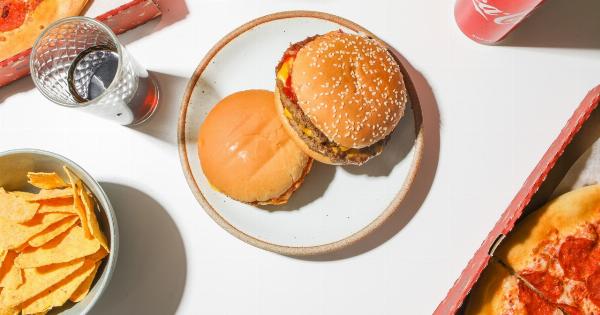Cancer is a complex disease that can be influenced by a variety of factors including genetics, lifestyle choices, and environmental exposures.
While it is important to note that diet alone cannot prevent or cure cancer, several studies have suggested a link between certain foods and an increased risk of cancer progression. In this article, we will explore some of these foods and the evidence supporting their potential role in cancer progression.
Processed Meats
Processed meats such as bacon, sausages, hot dogs, and deli meats have long been associated with an increased risk of various types of cancer.
These meats are often high in unhealthy fats, sodium, and additives, and are typically preserved using methods that can produce carcinogenic compounds. Several studies have linked the consumption of processed meats to an increased risk of colorectal, stomach, and pancreatic cancer. To reduce your risk, it is advisable to limit your intake of processed meats and opt for lean sources of protein instead.
Sugar-Sweetened Beverages
Sugar-sweetened beverages like soda, fruit juices, and energy drinks have become staples in many people’s diets. However, these drinks are not only high in added sugars but also devoid of essential nutrients.
Regular consumption of sugary beverages has been linked to an increased risk of several types of cancer, including breast, pancreatic, and colorectal cancer. To reduce your risk, opt for water, herbal teas, or homemade fruit-infused water as healthier alternatives to satisfy your thirst.
Deep-Fried Foods
Deep-fried foods, including fried chicken, French fries, and doughnuts, are beloved by many, but they come with a downside.
When foods are deep-fried, they can form higher levels of harmful compounds such as acrylamide, heterocyclic amines (HCAs), and polycyclic aromatic hydrocarbons (PAHs). These compounds are known carcinogens and have been linked to several types of cancer, including lung, breast, and prostate cancer.
It is advisable to limit your consumption of deep-fried foods and try alternative cooking methods like baking, grilling, or steaming.
Highly Processed Foods
Highly processed foods, such as fast food meals, packaged snacks, and sugary breakfast cereals, are often loaded with unhealthy fats, added sugars, refined grains, and artificial additives.
These foods are generally low in essential nutrients and high in calories. Studies have shown that a high intake of highly processed foods is associated with an increased risk of obesity, which in turn is linked to a higher risk of developing certain types of cancer, such as breast, colon, and pancreatic cancer.
To reduce your risk, focus on whole, unprocessed foods and incorporate more fruits, vegetables, whole grains, and lean proteins into your diet.
Charred and Grilled Meats
Cooking meat at high temperatures, such as grilling or charring, has been shown to produce harmful compounds called heterocyclic amines (HCAs) and polycyclic aromatic hydrocarbons (PAHs).
These compounds can damage DNA and potentially lead to cancer development. Several studies have found a link between the consumption of charred or grilled meats and an increased risk of colorectal, pancreatic, and prostate cancer.
To lower your exposure, consider marinating meat before grilling, using smaller cuts of meat, and avoiding charring or burning during cooking.
Artificial Sweeteners
Artificial sweeteners, like aspartame, sucralose, and saccharin, are commonly used as sugar substitutes in various foods and beverages.
While artificial sweeteners are often marketed as healthier alternatives to sugar, some studies have suggested a potential link between their consumption and increased cancer risk. However, the evidence on this topic is mixed, and more research is needed to draw definitive conclusions.
To be on the safe side, it is advisable to moderate your intake of artificial sweeteners and opt for natural sweeteners like stevia or honey whenever possible.
Salted and Pickled Foods
High intake of salt-preserved foods or those that are pickled has been associated with an increased risk of stomach and esophageal cancer.
These foods contain high levels of sodium and are often preserved using nitrites or nitrates, which can be converted into compounds that have been linked to cancer. To reduce your risk, it is important to moderate your consumption of salted and pickled foods and focus on fresh and minimally processed alternatives.
Refined Grains and Sugars
Refined grains, such as white bread, white rice, and refined pasta, have been stripped of their fiber and nutrients during processing.
Similarly, refined sugars, including white sugar and high-fructose corn syrup, provide empty calories and lack essential nutrients. Both refined grains and sugars have been associated with an increased risk of obesity, which can contribute to the development of various types of cancer.
Opt for whole grains like quinoa, brown rice, and whole wheat bread, and choose alternative natural sweeteners like maple syrup or dates whenever possible.
Alcohol
While moderate alcohol consumption has been associated with certain health benefits, excessive and long-term alcohol intake can have detrimental effects on health.
Alcohol is a known carcinogen and has been linked to an increased risk of several cancers, including liver, breast, colorectal, and esophageal cancer. To reduce your risk, it is advisable to limit your alcohol intake to moderate levels, which means up to one drink per day for women and up to two drinks per day for men.
Non-Organic Foods
Conventionally grown fruits and vegetables are often exposed to pesticides, while animals raised for non-organic meat and dairy products may be given hormones and antibiotics.
Some studies have suggested a potential link between exposure to certain pesticides and an increased risk of cancer. While the evidence is still inconclusive, choosing organic options whenever possible can help reduce your potential exposure to these substances.
Conclusion
Although many factors contribute to cancer progression, consuming a healthy diet can play a significant role in reducing the risk.
While no single food or dietary component can completely prevent or cure cancer, it is advisable to adopt a balanced and varied diet rich in whole, unprocessed foods while limiting your intake of processed and unhealthy options. By being mindful of the foods you consume, you can make positive choices that may reduce your risk of cancer and promote overall well-being.



























